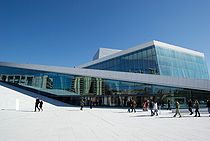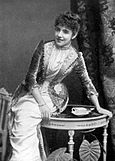Portal:Opera: Difference between revisions
article max to 20 |
change title "Selected picture" to "Featured picture", as all are of a Featured-level of quality. |
||
| Line 14: | Line 14: | ||
{{Random portal component|max=20|header=''Selected article''|subpage=Selected article|seed=3}} |
{{Random portal component|max=20|header=''Selected article''|subpage=Selected article|seed=3}} |
||
{{Random portal component|max=11|header='' |
{{Random portal component|max=11|header=''Featured picture''|subpage=Selected picture|seed=5}} |
||
{{/box-header|''In this month''|Portal:Opera/Selected anniversaries/{{CURRENTMONTHNAME}}|}} |
{{/box-header|''In this month''|Portal:Opera/Selected anniversaries/{{CURRENTMONTHNAME}}|}} |
||
Revision as of 04:30, 26 April 2009
The Opera PortalOpera is an art form in which singers and musicians perform a dramatic work (called an opera) which combines a text (called a libretto) and a musical score. Opera is part of the Western classical music tradition. Opera incorporates many of the elements of spoken theatre, such as acting, scenery and costumes and sometimes includes dance. The performance is typically given in an opera house, accompanied by an orchestra or smaller musical ensemble. Opera started in Italy at the end of the 16th century (with Jacopo Peri's lost Dafne, produced in Florence around 1597), and was championed by Claudio Monteverdi with works such as L'Orfeo. It soon spread through the rest of Europe: Schütz in Germany, Lully in France, and Purcell in England all helped to establish their national traditions in the 17th century. However, in the 18th century, Italian opera continued to dominate most of Europe, except France, attracting foreign composers such as Handel. Opera seria was the most prestigious form of Italian opera, until Gluck reacted against its artificiality with his "reform" operas in the 1760s. Today the most renowned figure of late 18th century opera is Mozart, who began with opera seria but is most famous for his Italian comic operas, especially The Marriage of Figaro, Don Giovanni, and Così fan tutte, as well as The Magic Flute, a landmark in the German tradition. The first third of the 19th century saw the highpoint of the bel canto style, with Rossini, Donizetti and Bellini all creating works that are still performed today. It also saw the advent of Grand Opera typified by the works of Meyerbeer. The mid to late 19th century is considered by some a golden age of opera, led by Wagner in Germany and Verdi in Italy. This 'golden age' developed through the verismo era in Italy and contemporary French opera through to Puccini and Strauss in the early 20th century. During the 19th century, parallel operatic traditions emerged in Central and Eastern Europe, particularly in Russia and Bohemia. The 20th century saw many experiments with modern styles, such as atonality and serialism (Schoenberg and Berg), Neo-Classicism (Stravinsky), and Minimalism (Philip Glass and John Adams). With the rise of recording technology, singers such as Enrico Caruso became known to audiences beyond the circle of opera fans. Operas were also performed on (and written for) radio and television.
Selected article
The Fairy-Queen (Z.629) is a masque or semi-opera by Henry Purcell; a Restoration spectacular. It was first performed on 2 May 1692 at the Queen's Theatre, Dorset Garden, in London by the United Company. The libretto is an anonymous adaptation of William Shakespeare's wedding comedy A Midsummer Night's Dream. Presumably the author or at least co-author of the libretto is Thomas Betterton, the manager of Dorset Garden Theatre with whom Purcell worked regularly. This assumption is based on an analysis of Betterton's stage directions. A collaboration between several playwrights is also feasible. Choreography for the various dances was provided by Josias Priest, who also worked on Dioclesian and King Arthur, and who was associated with Dido and Aeneas. Purcell did not set any of Shakespeare's text to music; instead he composed music for short masques in every act but the first. The play itself was also slightly modernized in keeping with seventeenth-century dramatic conventions, but in the main the spoken text is as Shakespeare wrote it. The masques are related to the play metaphorically, rather than literally. Many critics have stated erroneously that they bear no relationship to the play, but recent scholarship has shown that the opera, which ends with a masque featuring Hymen, the god of marriage, was actually composed for the fifteenth wedding anniversary of William and Mary.
Featured picture Credit: Alfred Bryan Gilbert and Sullivan created fourteen comic operas, including H.M.S. Pinafore, The Pirates of Penzance, and The Mikado, many of which are still frequently performed today. However, events around their 1889 collaboration, The Gondoliers, led to an argument and a lawsuit dividing the two. In 1891, after many failed attempts at reconciliation by the pair and their producer, Richard D'Oyly Carte, Gilbert and Sullivan's music publisher, Tom Chappell, stepped in to mediate between two of his most profitable artists, and within two weeks he had succeeded. This cartoon in The Entr'acte expresses the magazine's pleasure at the reuniting of D'Oyly Carte (left), Gilbert (centre), and Sullivan (right).
In this month
Selected biography
Jessie Bond (10 January 1853 – 17 June 1942) was an English singer and actress best known for creating the mezzo-soprano soubrette roles in the Gilbert and Sullivan comic operas. She spent twenty years on the stage, the bulk of them with the D'Oyly Carte Opera Company. Bond began a concert singing career in Liverpool by 1870, after which, at the age of 17, she entered into a brief, unhappy marriage. After leaving her abusive husband, she continued her concert career and studied at the Royal Academy of Music. At the age of 25, Bond began her theatrical career, creating the role of Cousin Hebe in Gilbert and Sullivan's H.M.S. Pinafore. After this, she created roles of increasing importance with the D'Oyly Carte Opera Company in a series of successful comic operas, including the title role in Iolanthe (1882), Pitti Sing in The Mikado (1885), and others. During the 1890s, she continued performing on the West End, while being courted by Lewis Ransome, a civil engineer. In 1897, at the age of 44, Bond married Ransome and left the stage. They were happily married for 25 years; however, she survived Ransome by twenty years, living to the age of 89.
Selected quoteSelected audioFrom Giacomo Puccini's Gianni Schicchi, sung by Frances Alda (1919). Did you know...
WikiProjects
WikiProject Arts • WikiProject Music • WikiProject Theatre
WikiProject Richard Wagner • WikiProject Gilbert and Sullivan
WikiProject Classical music • WikiProject Composers What are WikiProjects? Opera topicsOpera history: Origins of opera • Italian opera • Opera in German • French opera • Opera in English • Polish opera • Russian opera • Hungarian opera • Armenian opera • Opera in Latin America Opera genres: Azione teatrale · Ballad opera · Comédie en vaudevilles · Comédie mêlée d'ariettes · Dramma giocoso · Dramma per musica · Farsa · Festa teatrale · Género chico · Grand Opera · Music Drama · Opéra-ballet · Opera buffa · Opéra bouffe · Opéra bouffon · Opéra comique · Opéra féerie · Opera semiseria · Opera seria · Operetta · Pastorale héroïque · Romantische Oper · Savoy opera · Semi-opera · Singspiel · Spieloper · Tragédie en musique · Verismo · Zarzuela · Zeitoper Opera terms: Aria · Aria di sorbetto · Arioso · Bel canto · Breeches role · Burletta · Cabaletta · Cadenza · Cantabile · Castrato · Cavatina · Chest voice · Claque · Coloratura · Comprimario · Convenienze · Coup de glotte · Da capo aria · Diva · Entr'acte · Fach · Falsetto · Fioritura · Gesamtkunstwerk · Head voice · Intermezzo · Kammersänger · Leitmotif · Legato · Libretto · Literaturoper · Mad scene · Maestro · Melodrama · Melodramma · Monodrama · Messa di voce · Opera house · Passaggio · Portamento · Prima donna · Prompter · Recitative · Regietheater · Répétiteur · Sitzprobe · Spinto · Sprechgesang · Squillo · Stagione · Surtitles · Tessitura · Timbre · Vibrato Opera voices: Baritenor · Baritone · Bass · Bass-baritone · Coloratura soprano · Contralto · Countertenor · Dramatic soprano · Haute-contre · Lyric soprano · Mezzo-soprano · Soprano · Soubrette · Spinto soprano · Tenor · Tenore contraltino · Tenore di grazia Opera lists: Opera topics • List of operas by composer • Important operas • Major opera composers • Opera librettists • Opera houses • Opera companies • Opera festivals • Opera directors • Operetta composers • Orphean operas • Zarzuela composers • Opera genres • Operas set in the Crusades • The Record of Singing • Bayreuth canon Featured content
Featured articles
Featured listsGood articles
Featured pictures
Featured portalsFeatured topics
Things you can do
CategoriesRelated portalsAssociated Wikimedia |

























































































































































